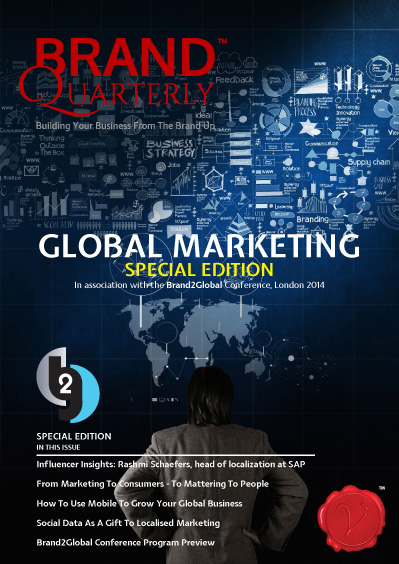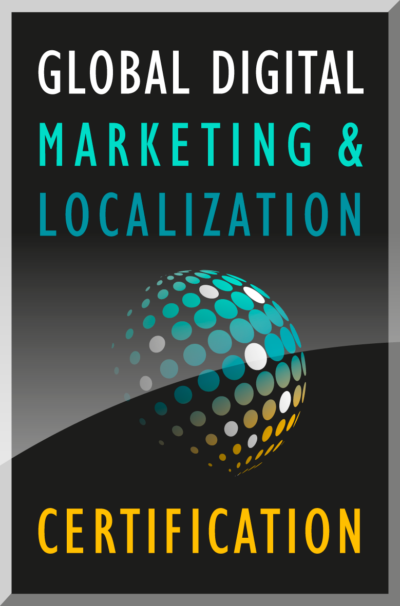This is an excerpt of the full interview between Fiona Vesey and Rashmi Schaefers, VP of Content Services & Localization at SAP, published in the Brand Quarterly & Brand2Global ‘Global Marketing’ Special Edition.
 In talking with Rashmi Schafers (VP of Content Services & Localization at SAP) it was abundantly clear she has a true passion for sharing her knowledge and expertise in the localization field. Rashmi allows us a window into her years of experience, managing international marketing and roll-out programs, that make her is a genuine thought leader in the industry. – Thanks Rashmi.
In talking with Rashmi Schafers (VP of Content Services & Localization at SAP) it was abundantly clear she has a true passion for sharing her knowledge and expertise in the localization field. Rashmi allows us a window into her years of experience, managing international marketing and roll-out programs, that make her is a genuine thought leader in the industry. – Thanks Rashmi.
Fiona
In your role leading content services and localization at SAP, what do you see as your number one objective right now?
Rashmi
There are a few things that are really important for us right now. One of those is really understanding and reaching not only our customer, but also our customers’ customer. You’ll see us in fact marketing to the users of our customers’ products, so that they understand how they’re benefiting from the fact our customers are leveraging SAP products and software. This creates an extensive “network effect” that actually has a significant impact on the global economy. So that makes the whole concept of localization – and how we communicate to through to our global business network including our customer’s customers — even more important.
That’s a really key point right now. Language is a given – everything needs to be in a local language. It’s about making sure that you’re tailoring your messaging and that you’re able to really ‘speak’ to that target audience.
So that might be very different even for example, in a country like Germany, which is obviously a very important market for SAP. A lot of people don’t actually know SAP is a German company; as we’ve reached such a global status that people don’t always know where we come from.
We have an interesting dichotomy here in Germany, because we obviously have a large enterprise space where SAP has claimed 99% of the market. On the other hand we also have a very strong presence in the small and medium size business market, which is a very powerful market here. There are 1000s of these companies. They have a tremendous economic influence but they’re a very different market. These folks don’t speak necessarily speak fluent English and you cannot assume that they’re going to understand something with foreign connotation automatically.
Not only that, but they’re very deep into whatever industry they’re in. So you have to actually go even deeper from a localization perspective than if you’re targeting only large enterprises. You have to understand not only the local colloquialism of that particular market but also the industry speak in-order to be able to connect with them.
Fiona
Excellent. So by connecting with your customers’ customers, you become more valuable to your actual customers. And it also helps create a second sphere of brand loyalty.
Rashmi
Yes. One of the pivotal changes that has happened in the last decade is the rise of social media. Because users are now able to reach and interact with each other through social media platforms such as Twitter and Facebook and make recommendations, what we’re seeing is a whole shift in terms of who’s controlling the brand. This is in fact an opportunity for brands like SAP, because we are able to take part those conversations and gain tremendous insights into our customers and their perceptions of our products. As such, through social media we can stay close to our customers, understand what is trending, and react in real time.
And, most of the time our customers are having a dialogue with ‘each other’. We’re not necessarily involved. This is the beauty of it – we can get to the heart of our customers’ perceptions, interests and motivations without doing expensive focus groups or having a complicated infrastructure to gain this information. We can get it real time now, and so I see it as a tremendous opportunity and a game changer in fact.
Fiona
Not only is it real time, it’s also an open and honest way of communicating. You’re listening and hearing what they have to say rather than directing the conversation to drag answers out of them as in focus groups.
Rashmi
Exactly, absolutely – this is a huge opportunity and as I said, it’s a game changer for us right now.
Fiona
What are the challenges you face making that connection, when you’re narrowing it down to an industry or region?
Rashmi
If you think about SAP, how did we really make our mark? Why did SAP become so successful? They did one thing – gained deep understanding of businesses’ processes in a variety of industries. SAP was one of the first companies to go deep into finance, or manufacturing, or supply chain in different industries and really understand the intricate differences in relevant countries. This is our DNA and still our core strength.
To translate it to your question, it’s really about deeply understanding those industries where our software is being used and also understanding our customers’ challenges. This is the crux of being able to “speak our customers’ language.”
It goes beyond foreign language. Even in our industry, in SAP – we have our own language. It’s about being an integral part of that industry, to understand it really well. We have continued that trend and now we’re able to actually partner with ‘our’ customers to translate that benefit over to ‘their’ customers.
It’s interesting that you asked ‘What are the challenges?’ because I actually think it’s the opposite. There are so many opportunities to connect, because a deep knowledge of industry, culture and language opens up the lines of communications with our customers and prospects. And then it goes beyond being just about communicating and becomes about being part of a continuous dialogue.
Fiona
What about business, or operational challenges?
Rashmi
Something we are seeing across the industry is that marketing budgets are shrinking. There’s a lot of pressure from an operational perspective on cost cutting, getting efficiencies, increasing our businesses impact and overall, doing more with less.
This is putting a lot of pressure on managers across the industry and I believe localization can actually help to get more impact, if you do it right – if you really understand the principles and you invest up front. You can actually target your marketing investment in those markets where you’re going to have the biggest impact.
Localization has tended to be an afterthought. But I think folks that are well versed in localization can have a big impact, especially given the rise in strategic importance of foreign markets and the need to drive revenue growth in these markets. Localization teams can have an impact on the business to make sure that investments in foreign markets are leveraged appropriately and local programs are efficiently and effectively executed.
…….
You can read the full article in the Brand Quarterly & Brand2Global ‘Global Marketing’ Special Edition.









